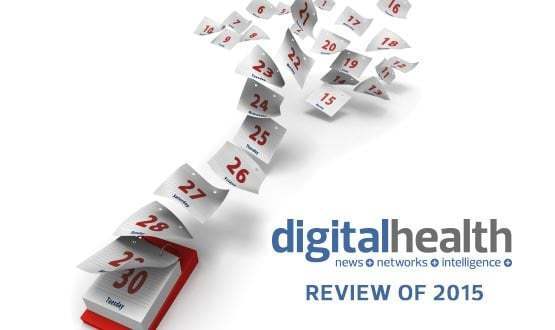Digital Health’s review of the year, 2015
- 29 December 2015

The year opened with an NHS winter crisis, which added spice to the general election campaign. With the poll out of the way in May, debates about finance got serious. In November, the Treasury promised to stump up for the ‘Five Year Forward View’ – and found £1 billion for healthcare technology.
Away from the corridors of power, central bodies and NHS trusts got on with their own IT projects. Some went well. Some went badly. And perceptions of Cambridge’s marquee implementation of Epic toggled back and forth between the two.

As the year opened, trusts that had been waiting to find out whether they had been successful in their tech fund 2 bids continued to wait. A survey by eHealth Insider found that many IT directors feared the money had been snaffled by the Treasury.
Meantime, the Health and Social Care Information Centre announced that the new E-Referral Service was set for a period of ‘extended testing’ before it took over from Choose and Book. But plans to get North, Midlands and East trusts ready to exit their National Programme for IT contracts by July 2016 were going relatively well.

At the end of the month, fears that tech fund 2 had fallen victim to ‘winter pressures’ were confirmed when it emerged that the ‘Integrated Digital Care Technology Fund’ had been cut from £240 million to £40 million.
In more positive news, St George’s Healthcare NHS Foundation Trust became the first London trust to quit the BT data centre ahead of its planned closure in October. In doing so, it became a model for the other trusts in London and the South that were due to exit their national programme contracts for Cerner Millennium and Servelec RiO.
Another NPfIT-era project, the NHS Summary Care Record, was able to announce that it had finally reached 50m patients. And in a very non-NPfIT development, it was announced that a community interest company had been formed to support the open version of IMS Maxim’s patient administration system.

With the general election just three months away, pundits started to wonder what it would mean for the health service. NHS England’s chief executive, Simon Stevens, said that whoever came to power would have to push ahead with the ‘Five Year Forward View’ – his plan to close a £30 billion gap between funding and demand by 2020-21, issued the previous October.
In a sign of the pressure on the acute sector, Barts Health NHS Trust became the first of a series of high-profile organisations to be put into special measures, with its extension of Cerner Millennium cited as contributing to its financial problems.

The political parties issued their manifestos, with Labour saying little or nothing about NHS IT, the Lib Dems promising access to GPs via Skype, and the Tories re-running the pledge to give patients online access to their medical records that they made in 2010. Somewhat surprisingly, part of the pledge (to give patients access to a subset of the information held in their GP record) was delivered at the end of the month.
Away from the election, it was announced that David Kwo, one of the leading figures in the Cambridge University Hospitals NHS Foundation Trust's Epic deployment in 2014, was to return to London to work on a replacement IT system for University College London Hospitals NHS Foundation Trust. And in big contract news, it was announced that IBM would take over the NHS Electronic Staff Record and Accenture would take over NHSmail.

The general election took place and led to a Conservative majority, with a near-wipe out of the Liberal Democrats. Jeremy Hunt, the health secretary before the election, returned to his job in Richmond House. There, he may or may not have been grateful to Prime Minister David Cameron for promising a seven-day NHS with a mix of traditional and technology-enabled GP services.
Also at the start of the month, Digital Health Intelligence Limited made its own news when it rebranded the eHealth Insider news site and moved it onto a new domain: digitalheallth.net to provide a better platform for its news, Intelligence service, and networks.

With the election over, Chancellor George Osborne moved to announce a new spending review; and NHS England chief executive Simon Stevens moved to make sure that NHS funding was high on its agenda. Stevens also told the NHS Confederation that the NHS 111 service and NHS Choices would become NHS.uk.
The following week, the commissioning board’s director of patients and information, Tim Kelsey, startled a meeting of the National Information Board by claiming that IT could contribute as much as £13.7 billion a year to the NHS’ hunt for efficiency savings. Unfortunately, he gave no details as to how.
Emis announced that the Gibraltar Health Authority had gone live with an integrated care record spanning its hospital, GP and pharmacy services. Back in the UK, the E-Referral Service finally went live, fell over, stabilised, fell over again…

The NHS was given another digital champion – Martha Lane Fox, the founder of lastminute.com and, more latterly, expert in digital inclusion; as one of Tim Kelsey’s big ideas, the introduction of the US 311 service under the banner Care Connect, collapsed.
Digital Health Networks ran the annual Health CIO and CCIO Network summer schools. The latter welcomed David Stables, the co-founder of Emis, who has invested millions of his personal fortune in a charity, Endeavour Health, to “kickstart” interoperability in the NHS and to lay the foundations for a personal health record for every citizen.

The Health and Social Care Information Centre issued an update on the planning underway to help NME trusts exit their national programme contracts in July 2016. Perhaps surprisingly, given the controversy generated by the programme, most trusts and GP practices look set to stick with the systems they received from their local service provider, CSC.
Meanwhile, another trust that had been set for a bold electronic patient record roll-out pulled back. Papworth Hospital NHS Foundation Trust announced that it was not going to join the Cambridge eHospital programme after all; and would not be implementing Epic.
Two trusts made more innovative IT decisions. Wye Valley NHS Trust became the second to pick the open source openMaxims EPR, and The Royal Orthopaedic Hospital NHS Foundation Trust became the first to pick the PICS clinical decision support system developed by its neighbour, University Hospitals Birmingham NHS Foundation Trust, and distributed by Servelec.

Think-tanks ramped up pressure on the Treasury’s spending review to find and ‘frontload’ the Conservatives’ £8 billion. They pointed out that the acute sector is looking at a deficit of £2.5 billion this year, and argued that a ‘transformation fund’ would be essential to do more than keep the lights on.
NHS England’s director of digital technology, Beverley Bryant, unexpectedly announced that clinical commissioning groups were going to be given the job of driving the NHS digital agenda; by drawing up digital roadmaps.
And the chief executive of Cambridge, Keith McNeil, stepped down ahead of a CQC report that led to his trust to become the latest to be put into special measures. The CQC cited its eHospital programme as one of the reasons for its financial and other woes.

The E-Referral Service was back in the news; for having failed to produce any reports for users in the four months since its troubled go-live. As if to prove that it wasn’t just English projects that could go wrong, the new IT system for NHS 24 in Scotland was reported to be late and £41 million over budget.
As if to prove that it wasn’t just the NHS that could get things wrong, the Information Commissioner’s Office came down hard on Pharmacy2U, after it was found to have sold customer data to a marketing firm that passed it onto some dubious companies.

As bidding for spending review cash reached fever pitch, it emerged that NHS England was looking for between £3 billion and £5 billion of NHS IT spending over the next five years. Thanks to Spinwatch, Digital Health News established that this was on the basis of a McKinsey report suggesting that this level of spending (plus a few billion for implementation, training, and ongoing support) might yield savings of between £8 billion and Kelsey’s £13.7 billion.
In the event, the Treasury said it would “fully fund” the Five Year Forward View and that £1 billion would go on NHS IT. Documents indicated it expects this to achieve the ‘Personalised Health and Care 2020’ ambitions to have paperless working by 2018 and fully integrated health and social care records by 2020.
With that bit of the future dealt with, a big bit of the past came to an end when the last London and the South acute trust exited the BT data centre just a week late. That trust, North Bristol, also swapped one system closely associated with the national programme (Cerner Millennium) for another (CSC’s Lorenzo).
NHS 24 finally switched on its new IT system, only to see it fall over almost immediately. Shortly afterwards, it announced it was abandoning the “challenging” technology. And on the subject of costly mistakes, it emerged that the failed 311 / Care Connect service had cost £1.2 million – or £1,600 for every query it dealt with.

NHS England started the hunt for a replacement for Tim Kelsey, who left on 12 December for a new job at Australian telco Telstra, the new owners of the company he co-founded, Dr Foster. Martha Lane Fox issued her report on digital inclusion, suggesting some of the Treasury’s billion should go on free wi-fi.
Digital Health News editor Jon Hoeksma secured a rare and wide-ranging interview with Judy Faulkner, the founder and chief executive of Epic. In it, she insisted that Cambridge will come to be recognised as a reference site for the benefits of healthcare digitisation.




